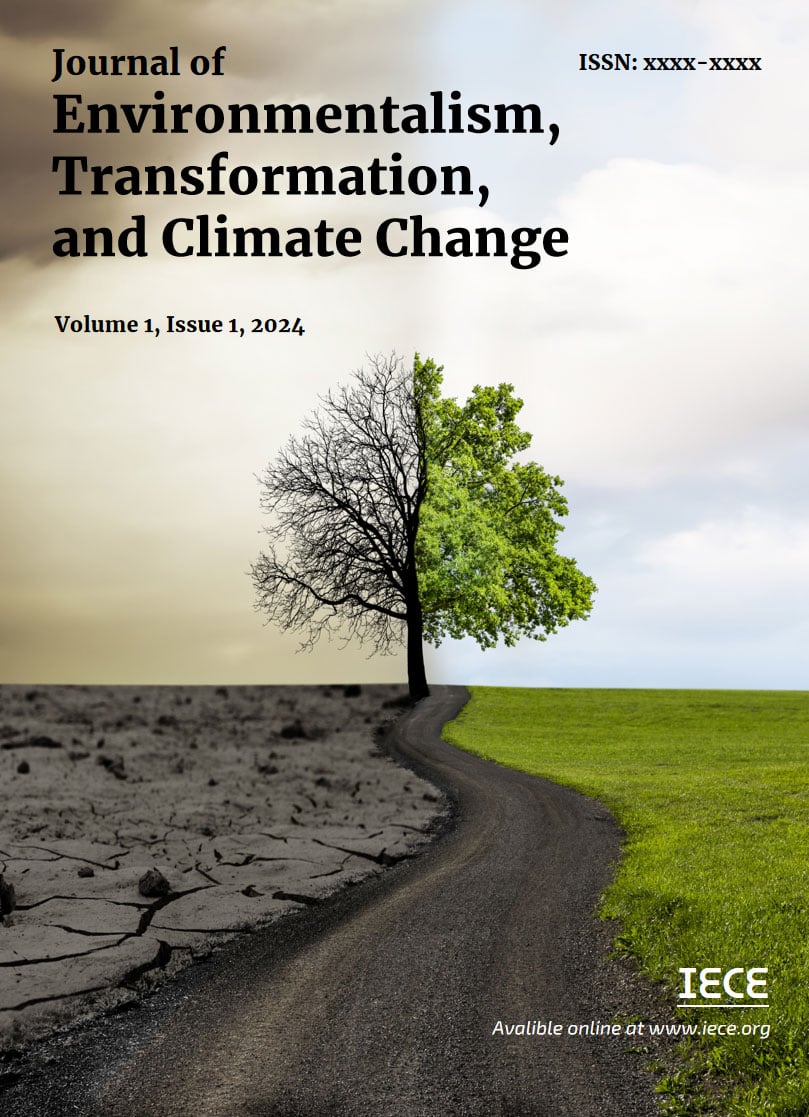Journal Information
Journal of Environmentalism, Transformation, and Climate Change
Online ISSN: request pending
Print ISSN: request pending
Publishing model: Open Access
DOI Prefix: 10.62762/JETCC
Aims & Scope
The Journal of Environmentalism, Transformation, and Climate Change is an international, peer-reviewed journal dedicated to advancing interdisciplinary research on environmentalism, sustainable transformation, and climate change. The journal aims to provide a platform for scholars, practitioners, policymakers, and activists to explore innovative solutions, share knowledge, and contribute to a deeper understanding of the complex interactions between human societies and the natural environment. It focuses on promoting research that fosters environmental justice, resilience, and sustainable development in the face of global environmental challenges.
The journal covers a wide range of topics, addressing the diverse and multifaceted aspects of environmentalism and climate change. Its scope includes, but is not limited to, the following areas:
1. Environmentalism and Social Transformation
Historical and contemporary environmental movements
The role of environmental activism in societal change
Indigenous and traditional knowledge systems in environmental conservation
Environmental ethics, philosophy, and the intersection with social justice
2. Climate Change Science and Adaptation
Impacts of climate change on ecosystems, biodiversity, and human health
Climate change adaptation and mitigation strategies
Technological innovations for climate resilience
Policy frameworks and international agreements on climate action (e.g., Paris Agreement, SDGs)
3. Sustainable Development and Green Economy
Pathways to sustainable development in the context of climate change
Green economy, circular economy, and sustainable business practices
The role of renewable energy, sustainable agriculture, and waste management
Socio-economic impacts of transitioning to low-carbon economies
4. Environmental Policy, Governance, and Law
Environmental policy analysis and implementation at local, national, and international levels
Environmental governance models, institutional frameworks, and regulatory approaches
Cross-border environmental cooperation and diplomacy
The role of non-governmental organizations (NGOs) and civil society in shaping environmental policies
5. Equity, Inclusion, and Environmental Justice
Addressing inequality in environmental impacts and climate vulnerability
The intersection of gender, race, and socio-economic status with environmental issues
Community-led conservation and empowerment initiatives
Case studies on environmental justice and equitable resource management
6. Urbanization, Land Use, and Ecosystem Management
Sustainable urban planning and resilience in the face of climate change
Land use change, deforestation, and habitat loss
Conservation of natural resources and ecosystem services
Innovative approaches to biodiversity conservation and landscape restoration
7. Education, Communication, and Behavioral Change
Environmental education and transformative learning for sustainability
The role of media, communication, and digital platforms in raising environmental awareness
Behavioral change theories and practices for sustainable living
Youth engagement and activism in addressing climate and environmental challenges
8. Case Studies and Regional Perspectives
Comparative studies on environmental policies and practices across different regions
Case studies on successful environmental initiatives and best practices
Challenges and opportunities in environmental management in developing countries
Regional analyses of climate impacts, with a focus on vulnerable areas (e.g., South Asia, Sub-Saharan Africa)
9. Innovative Research and Emerging Trends
The role of artificial intelligence, big data, and digital technologies in environmental management
Emerging trends in environmental science, technology, and innovation
Integrating interdisciplinary research for holistic environmental solutions
The future of environmentalism in the Anthropocene
Submission Guidelines
The Journal of Environmentalism, Transformation, and Climate Change welcomes original research articles, review papers, case studies, policy briefs, and book reviews. Submissions must provide novel insights, theoretical advancements, or practical solutions to contemporary environmental challenges. All manuscripts are subject to rigorous peer review to ensure the highest standards of scholarly excellence.
Audience
The journal targets a diverse audience, including academics, researchers, environmental practitioners, policymakers, educators, and activists who are committed to advancing sustainable and equitable solutions to environmental and climate-related issues.
Publication Frequency
Quarterly
Ownership

The journal is owned by Institute of Emerging and Computer Engineering.
Archiving
All journals published by IECE are archived in Portico, which provides permanent digital archiving for scholarly journals.
Ethics Statement
IECE is responsible for implementing rigorous peer review and strict ethical policies and standards to ensure that high quality scientific work is added to the field of scholarly publishing. IECE takes such publishing ethics issues very seriously, and our editors are trained to enforce COPE's Core Practices and Guidelines, with a zero-tolerance policy for plagiarism, data falsification, and other behaviours. To verify the originality of content submitted to our journals, we use iThenticate to check submissions against previous publications.



